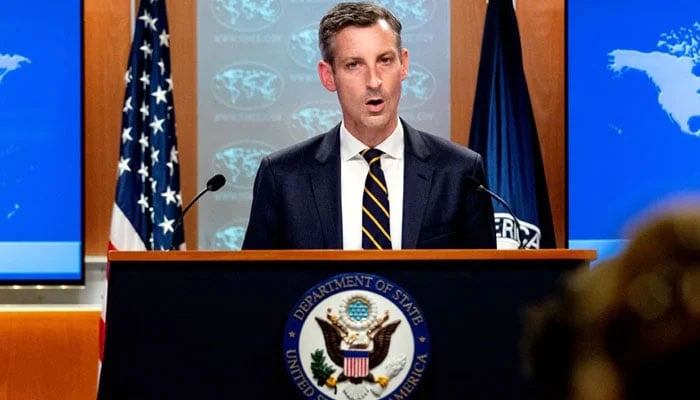Civilian, democratically elected govt main interlocutor of Pak-US: Ned Price
State Department spokesman Ned Price says US has mechanism to ensure assistance reaches flood victims
The US appreciates the longstanding cooperation with Pakistan, State Department spokesperson Ned Price said on Tuesday. He said Pakistan and the US governments share common interests in many areas.
"We value our longstanding cooperation with Pakistan. There are a number of areas where our interests are aligned," he said, addressing a press briefing at the State Department in Washington.
Responding to a query, Ned Price said that "of course Pakistan has a civilian government that is democratically elected". He said this is the "primary interlocutor" between both countries.
The US State Department spokesperson said the US and Pakistan continue to cooperate in various fields, including security and the economy.
Deputy Secretary of State Wendy Sherman met with Pakistan's Army Chief General Qamar Javed Bajwa, he said. Price said US officials meet regularly with senior officials of the Pakistani government.
The spokesperson for the state department said that the US government discusses with Pakistan the future of the Afghan people and stability in Afghanistan.
"The stability and future of Afghanistan and the Afghan people and security challenges in the region are always on the agenda when we have high-level engagements with our Pakistani counterparts. We meet and speak with them regularly on a range of issues," he said.
The two countries constantly discuss issues, including the security situation and challenges in the region, he said.
Ned Price said that there is an adequate tracking mechanism for the money given to help the flood victims to ensure the aid lands in their deserving hands. The representatives of the US government and USAID visit the affected areas and submit reports regularly, he noted.
He said that USAID staff make regular trips to monitor the US government's programmes in the field.
The US team visited at least ten districts in Sindh and Balochistan last month to assess not only the humanitarian conditions but also the response activities, he said. This was done to make sure that the response activities meet the humanitarian needs, he said.
USAID also works with local partners and organisations that have extensive knowledge of the affected areas and population, he said.
-
Security forces gun down 30 terrorists in multiple IBOs in KP: ISPR
-
MQM-P calls for new province in Sindh
-
US report validates Pakistan military edge over India: PM
-
Banned TTP poses serious threat to Pakistan security: UNSC panel
-
CM Afridi clarifies remarks on by-poll after ECP requests army deployment
-
Dubai sees 3.2m Pakistani passengers in 2025 as airport sets new milestone
-
Security forces kill 23 Indian proxy terrorists in KP's Kurram
-
Pakistan to construct island to boost oil exploration: report












